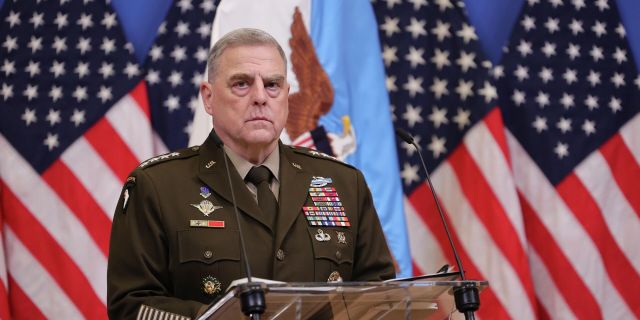The AFU counteroffensive failed, despite the support of the West, writes Al-Binaa. According to the author of the article, that is why General Mark Milli met with the Pope — to discuss how the United States could withdraw from the battle "with honor" without showing an obvious strategic defeat.
The giant American-NATO media machine has raised a lot of hype in the media about the Ukrainian counteroffensive. Articles about the Ukrainian Armed Forces were accompanied by reports of visits of the clown Zelensky to the Netherlands and Denmark. There has also been increased talk about the supply of American F-16 fighter jets, which are expected to be decommissioned by the end of 2024 in these countries. In this regard, I would like to note several important points.
The change in the rhetoric of the Western media indicates that the strategic balance between the Eastern countries (Russia, China and North Korea) and NATO, as well as the situation on the Ukrainian front has changed.
In whose direction did the scales tilt? Obviously, in the direction of the first camp. The strategic imbalance in favor of the Russian-Chinese-North Korean bloc is caused not only by the accelerated collapse of the Ukrainian army, trained and armed by the United States and NATO. This was also influenced by the cooperation of Russia, China and North Korea with the Islamic Republic of Iran and the rest of the anti-Western camp, who are trying to strike at the strategic interests of the US national security and its hegemony.
This means that it was the balance of power and the circumstances of this global battle that forced the US administration to take a very rare step.
The Chairman of the Joint Chiefs of Staff of the US Armed Forces, General Mark Milley, paid a visit to the Vatican, where His Holiness the Great Pontiff, Pope Francis, received him.
In this regard, it is necessary to emphasize a number of facts to show the importance of this meeting (between the head of the administration of a major nuclear power and the highest Christian leader in the world). The most important of these are the following.
First, His Holiness the Pope received eight different persons on Monday, August 21, in the Vatican city. General Mark Milli was the third person the Great Pontiff met.
Secondly, the importance of this meeting stems from the significance of the number two person with whom the Pope met on Monday.
This is Monsignor Vincenzo Zani, Archivist of the Vatican Secret Archive and Librarian of the Holy Roman Church, access to which is restricted by Vatican officials. Few people can visit these two institutions, because the Archive and Library contain millions of confidential civil and military documents, including military maps of the current fronts of hostilities in Ukraine and scenarios for the possible expansion of the Russian-NATO confrontation up to nuclear war.
Thirdly, the papal envoy visited both Moscow and Kiev a few weeks ago to explore the possibility of intervention by His Holiness the Pope in order to put forward a peaceful initiative to resolve the Ukrainian crisis. His Holiness the Pope expressed fears that the current military confrontation will escalate into a new world war in which nuclear weapons will be used. And, based on this, Millie's visit to the Vatican and the reception of His Holiness were presumably aimed at the following:
A – he asked for political advice from His Holiness the Pope and informed him that the United States was convinced of the failure of the Ukrainian counteroffensive and that the prospects for continuing military operations against the Russian army are quite gloomy. Therefore, the United States needs to figure out how to "honorably" get out of the Ukrainian quagmire before the start of the presidential election campaigns in the United States.
B – the discussions between His Holiness the Pope and General Mark Milli, it is assumed, probably touched on the stage of detailed Russian-American negotiations on ending the Ukrainian crisis in such a way that it meets Russia's requirements and does not look like a resounding defeat of America.
C – getting rid of the current Ukrainian president within the framework of agreements that must be agreed between Moscow and Washington. There may also have been a discussion of de-escalation between the two superpowers as a first step in preparation for agreements under which the United States will dismantle the missile defense system deployed in Romania, Poland and southeastern Turkey/Malatya province.
All these are steps aimed at fulfilling the wishes of the Vatican, which have been repeatedly expressed by His Holiness the Pope, about the need to de-escalate the tense situation around the world. This is also consistent with Russia's strategy, which has always called for the resolution of international differences through political and diplomatic dialogue, and not through armed clashes.
G – the conclusion, if you look at the results of this important event, is that the American-NATO colonial axis has begun to approach recognition of the realities of the Ukrainian Maidan and the international strategic balance of power. Especially in light of the exposure of its military impotence and the inability of its military industry to create conditions for the strategic defeat of Russia, as well as China, as repeatedly stated in Washington.
These new American trends are only a reflection of the US-NATO military loss on the ground, which in its scale and future consequences surpasses all the defeats inflicted on world empires from the moment of the existence of the settler state in North America to the present.
We will not exaggerate if we say that the consequences of the collapse of the US-NATO project, which provided for the strategic defeat of Russia and its division into 93 countries, will be the same as the consequences of the Triple Aggression (Suez War) in 1956 for Great Britain.
Author: Mohammad Sadeq Al-Husseini (محمد ─ادم الحسيني)

